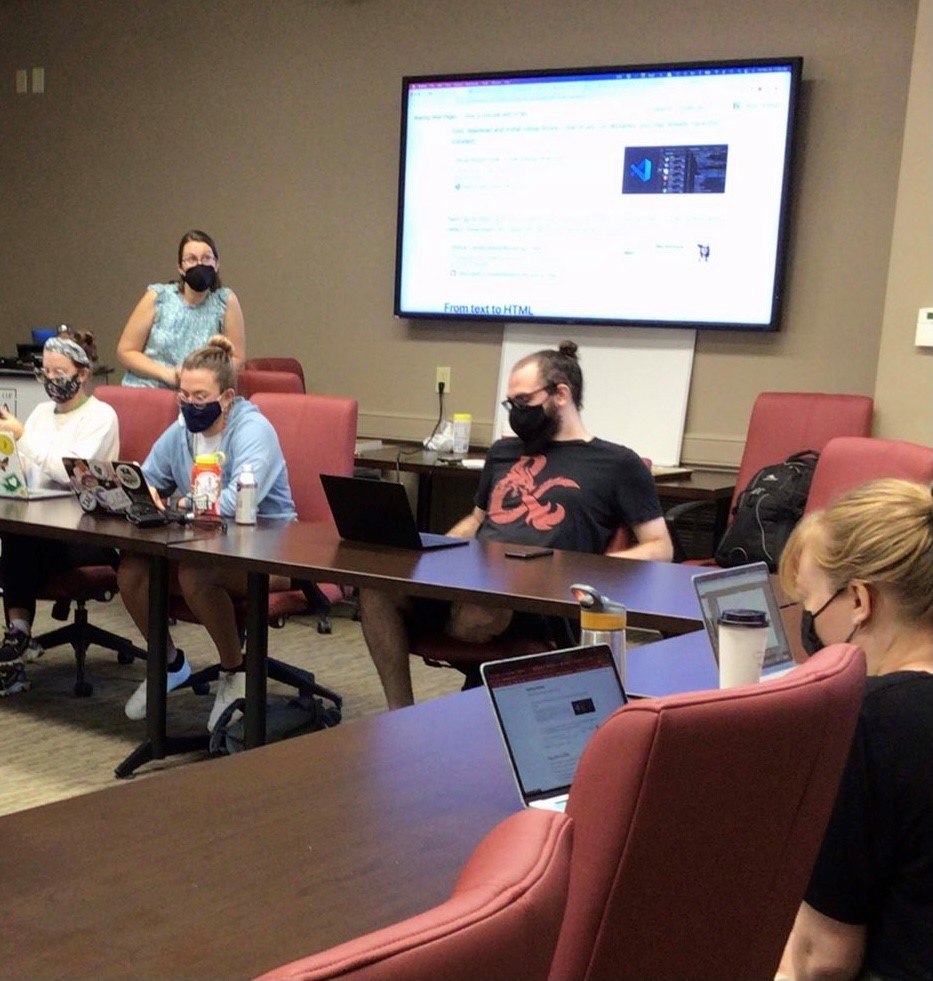
Erica Bennett, now in her second and final year of the REL MA, is from Louisiana and earned her undergraduate degree from Millsaps College. Working with Prof. Touna as her supervisor, she is also a T.A. this semester for Prof. Simmons’s REL 100 and Prof. Altman’s research assistant on the American Examples grant. She is interested in studying new religious movements.
The COVID-19 pandemic has shown that our society revolves around, and cannot function without, technology. From Netflix party hangouts and social media to collaborative online work spaces and daily Zoom meetings, technology seems to have become even more integrated into our daily lives. While people use the internet, websites, apps, and other technologies every day, most do not know how the internet works, that it is physical resource, or that anyone can learn to code or program. One reason I decided to enroll in the Religion in Culture MA program at the University of Alabama was the emphasis on helping students grow their digital humanities skills. Before my first class at UA, I expected to learn skills that would be helpful for digital projects like making podcasts, videos, and websites to distribute my research to a wider public. I did learn those skills (thank you REL 502!) and I get to practice them on a regular basis. What I did not expect to learn, and surprisingly really enjoy, was how to code and program to assist in my research efforts and better understand the digital world we live in.
I just completed the two-weekend (1 credit hour) seminar REL 503 Digital Methods for the Study of Religion and have a completely new perspective on what it means to have digital skills. I came into the course thinking “I understand the digital realm. I can make a podcast and research through JSTOR and EBSCO. What more is there? Do I even need to know how to code?” The answer is yes, I do need to know how to code. Not because one day I want to create an app or video game, but because coding and programing are useful tools in research. REL 503 showed me what can be done with coding in the humanities and how these resources and tools can aid in research. Let’s say I’m doing research on (insert some specific news outlet) and I want to know which, if any, of their stories are about Canada, or how often someone named “Phil” appears in their news stories. I can do this with coding and programing. Now these are silly examples, but the applications of the programing that I learned reach farther than word searching or counting. One example of the power of the digital humanities is a website by ORBIS on the Roman World of trade.
Though I loved learning the basics of coding and how it has been used in research and public digital humanities, my favorite part of the course was learning how to create webpages. I am far from an expert, but I now have the confidence not only to build a webpage from scratch through HTML and CSS, but also to find resources online to help me in that process. Just as academics are constantly referring to each other’s work or collaborating on research projects, coding and digital skills are collaborative and this allows for some really cool things to be done in the virtual space. I came into coding thinking that I had to learn a whole new language from the ground up, but people have already created the code and made their hard work public for people like me to use.
On the first day of REL 503, Professor Jeri Wieringa asked us what we were most nervous about for the class and there were so many different answers. For anyone venturing into the “backside” of the digital world, know that you are not alone in feeling intimidated. I absolutely was! But also know that there are so many resources for you to use and benefits to not only your research but the public reach that research could have. Because of REL 503, I have not only learned a new skill set but how to display it to those not privy to the academic world; I can finally show my parents what I do every day in a way they will understand. The skills I have learned in the MA program, and specifically in REL 503, will be an asset to any path I take for my future career path.